|
|
|
Sort Order |
|
|
|
Items / Page
|
|
|
|
|
|
|
| Srl | Item |
| 1 |
ID:
138934


|
|
|
|
|
| Summary/Abstract |
This article proceeds from a photograph. It does so to begin an investigation of the diverse sites within and beyond it, and the reflections of several enactments of nation, culture, belonging and non-belonging. The image in question depicts a group of children waving flags. It is an old photograph, possibly removed from our ‘present’, though it holds within it multi-temporal spaces into which we might enter. The aim of this article is to do just that – to enter the image, armed with all the things a researcher gathers in terms of background data, narratives and contexts, and examine the complex negotiations enacted within and beyond it. How does this group of flag-waving children impact on us today? This article explores the extent to which an understanding of a temporal enactment of nation in displacement might reflect on contemporary negotiations of citizenship, culture and representation.
|
|
|
|
|
|
|
|
|
|
|
|
|
|
|
|
| 2 |
ID:
126984
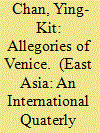

|
|
|
|
|
| Publication |
2013.
|
| Summary/Abstract |
This paper argues that although the state elites of Singapore use “Venice” as an image to legitimate the People's Action Party's continuous rule and unpopular immigration policies, the image has both empowered and constrained the state. To the state, Venice serves as a keyword that conjures up dynamism, progress, and continuity; to its critics, however, Venice signals the state's willingness to focus on the intangible elements of nationhood, namely culture and the arts. These critics use the ambiguities of the Venice rhetoric to legitimate their own appeals for change, especially after discovering that the “shared vision” of Venice is mainly in economic terms. By so doing, detractors of the state contest the centrality of economics in the making of modern-and future-Singapore, rendering the use of “Venice” as an image to promote the concept of a Global City problematic.
|
|
|
|
|
|
|
|
|
|
|
|
|
|
|
|
| 3 |
ID:
111493
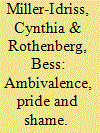

|
|
|
|
|
| Publication |
2012.
|
| Summary/Abstract |
This article examines complex everyday expressions and understandings of nationhood in Germany, focusing on citizens' articulations of national pride and their relationship with the nation. Through an analysis of ninety semi-structured interviews with 'ordinary' Germans conducted between 2000 and 2002, we argue that the prevailing, elite-centred approach to studying nationhood has not adequately captured the complex relationships that individuals have to the nation. We examine how individuals actively process and interpret nationhood in ways that reveal ambivalence, confusion and contradictory emotions towards the nation. Such individual variation is not neatly captured by official, elite, public or institutional presentations of the nation. We argue for further research on everyday understandings of nationhood and on ordinary people's views on national pride and national identity.
|
|
|
|
|
|
|
|
|
|
|
|
|
|
|
|
| 4 |
ID:
071233
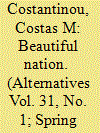

|
|
|
| 5 |
ID:
101981
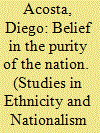

|
|
|
|
|
| Publication |
2010.
|
| Summary/Abstract |
Immigration is one of the most important issues in the European Union (EU). In order to address the subject, the EU adopted a Directive on a long-term residence status for third-country nationals (TCNs). While implementing this Directive, many Member States changed their migration laws, thus increasingly linking the acquirement of this status with integration requirements. The integration requirements emphasise language acquisition and knowledge of the country, including its history, culture, and constitution. Why is this trend taking place at this particular point in time? While many factors could be mentioned, these integration tests are also the consequence of the constant repetition in the belief of the purity of the nation in certain political discourses, particularly by the populist radical right. This line of thinking creates a worrying problem for the future as European national identities are seen as immutable, thus complicating the acceptance of the new Europeans with an immigrant background. Hence a question arises: To what extent can we see a correlation in some EU countries between the recent introduction of harsher integration requirements for obtaining permanent residence and a certain discourse on national identity, primarily put forward by radical right parties?
|
|
|
|
|
|
|
|
|
|
|
|
|
|
|
|
| 6 |
ID:
113607
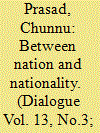

|
|
|
| 7 |
ID:
168831
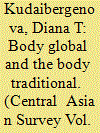

|
|
|
|
|
| Summary/Abstract |
What is the power of social media in defining and policing sexual identities and bodily expressions, and what are their connections to understanding nation, power and self in authoritarian contexts? Through the study of popular Instagram accounts in Kazakhstan and Russia, I argue that these sites serve as spaces of visualization and re-creation of new forms of ‘acceptable’ behaviour and lifestyles, that on the one hand may lead to new globalized visions of sexual identity and the body while on the other promoting localized conflict and resentment online, triggered by online users’ fear of losing their ‘national culture’ in these global trends. While many resort to policing gender norms and heteronormative body images online, influencers and Instagrammers from Russia and Kazakhstan take an active part in resisting these frameworks and categories.
|
|
|
|
|
|
|
|
|
|
|
|
|
|
|
|
| 8 |
ID:
152443


|
|
|
|
|
| Summary/Abstract |
Nation and diversity are often cast in oppositional terms. The present joint intervention explores the limits and possibilities of what we call ‘inclusive nation’, i.e. a nation which embraces rather than expunging diversity. To reflect on this idea, the Loughborough University Nationalism Network (LUNN) organized a symposium, bringing together both academics and relevant stakeholders, to explore both theoretically and practically the feasibility of the inclusive nation. For reason of space, here we present only the theoretical views of academics. While Billig and Yuval-Davis highlight the inherent exclusive thrust of nationalism, Kaufmann and Hearn suggest two distinct ways to move away the traditional understanding of nationalism as a site of singularity, oppression and exclusion. A final rejoinder by Nyhagen pushes the debate further interrogating the boundaries of national belonging.
|
|
|
|
|
|
|
|
|
|
|
|
|
|
|
|
| 9 |
ID:
069377
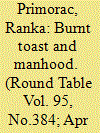

|
|
|
| 10 |
ID:
095455
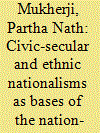

|
|
|
|
|
| Publication |
2010.
|
| Summary/Abstract |
The dominant Eurocentric paradigm of the nation and the nation-state was premised on western historical experience that was indigenous to the west but claimed universality for the rest. Many post-colonial countries, particularly those that went through national liberation struggles, like India and China, with multi-ethnic mobilisations, established sovereign states. The nationalist leaders claimed the unity of nationhood for their culturally diverse countries (states), with their millennia-deep civilisational identity, compelling a new discourse on the untenability of the classic Eurocentric paradigm. The second development witnessed the inevitable cultural heterogenisation of the western countries premised on the expansion of the (immigrant) labour market through an ever-enveloping regime of economic liberalisation and world trade. The catharsis of the invasion of cheaper labour from culturally diverse countries, often native-displacing, resulted in western countries attempting to accommodate the emerging changing reality in the context of mono-cultural nations through the concept and policy of multiculturalism. In spite of this, western countries have been witness to intercultural violence, racial discrimination and threats of home grown terrorism. The paper seeks to distinguish between 'pluralism' and 'multiculturalism' and argues for a reformulation of the concept of the nation-state that will have greater applicability across states.
|
|
|
|
|
|
|
|
|
|
|
|
|
|
|
|
| 11 |
ID:
099461


|
|
|
| 12 |
ID:
106675


|
|
|
|
|
| Publication |
2011.
|
| Summary/Abstract |
The amazing scenes that were beamed from Cairo's Tahrir Square in January and February 2011 conveyed an important revelation about the ingenuity and resourcefulness of the human spirit. In particular, they highlighted the miraculous power of joint public action not only to carve out spaces for freedom, but to forge a new shared identity which is indispensable for the establishment of a durable democratic order. No less significant, however, is that revolutionary action by pro-democracy insurgents has provided concrete answers to many puzzles that had exercised democracy theorists and Middle East experts for decades. By showing how such action can overcome the divisions and obstacles theorists have seen as an impediment to democratisation, the preoccupation with 'prerequisites' for democracy has been revealed as a diversion. From the American Revolution to Tahrir Square, pro-democracy revolutionary action has the power not just to overthrow tyranny, but also to refashion the nation, starting with the revolutionaries themselves. It can also 'overthrow' theory.
|
|
|
|
|
|
|
|
|
|
|
|
|
|
|
|
| 13 |
ID:
072650
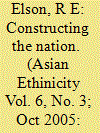

|
|
|
|
|
| Publication |
2005.
|
| Summary/Abstract |
This article examines the ways in which some early twentieth-century Indonesian thinkers conceptualised the state they had so recently imagined, and particularly how they attacked the vast problem of accommodating ethnic difference within the framework of that new state. Notwithstanding the highly promising beginnings of Indonesian self-appreciation in the early twentieth century and an extraordinarily successful cooptation and, as necessary, subjugation of local and regional expressions of ethnicity to the notion of a united Indonesia, there developed at the same time the new and strange concept of an 'Indonesian race'. That concept represented a regressive reluctance to dispense completely with pre-modern notions of culture and belonging, and created a damaging feature of the understanding of Indonesian citizenship that endures to this day.
|
|
|
|
|
|
|
|
|
|
|
|
|
|
|
|
| 14 |
ID:
089759
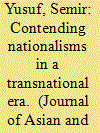

|
|
|
|
|
| Publication |
2009.
|
| Summary/Abstract |
Embarking on an outlook pertinent to the state of social fields in a global era, this article demonstrates the validity of the insight that rejects any strict bifurcation between localizing and globalizing tendencies in the maintenance of social life-worlds. By employing an appropriate term for the `transgressive' nature of nationalistic imaginations and actions, `transnationalism', it delves into qualitatively, but briefly analyzing the current status and futurity of, and the nature of the relationship that exists between, Ethiopianist and Oromo (a specific brand) nationalisms. The result is that neither of the two nationalisms seems to vanish amid the `network society' of the new global era, nor, by implication, is the contention between them likely to recede (until and unless they undergo significant, internal qualitative transformations).
|
|
|
|
|
|
|
|
|
|
|
|
|
|
|
|
| 15 |
ID:
158426
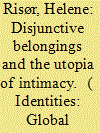

|
|
|
|
|
| Summary/Abstract |
The paper analyses practices of intimacy among youth in a poor, crime-ridden neighbourhood of Santiago. It argues that their sense of belonging to their neighbourhood and broader society is disjunctive: they inhabit the nation-state without complying with expectations of proper citizenship. Similarly, they dwell in their neighbourhood without identifying with it. Instead, they turn to intimate relations with friends and lovers as spaces of belonging. Through these often failing relationships, they pursue emotional and socio-economic stability and seek to fulfil expectations of social becoming and mobility. These intimate and romantic practices can both be understood as an utopian, affective promise that allows for imagining possibilities of a good life and as a moral exercise in the realisation of an adjacent self and we argue that intimacy constitutes a key site in the quest for social belonging among subaltern youth in neoliberal Chile.
|
|
|
|
|
|
|
|
|
|
|
|
|
|
|
|
| 16 |
ID:
160102
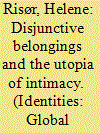

|
|
|
|
|
| Summary/Abstract |
The paper analyses practices of intimacy among youth in a poor, crime-ridden neighbourhood of Santiago. It argues that their sense of belonging to their neighbourhood and broader society is disjunctive: they inhabit the nation-state without complying with expectations of proper citizenship. Similarly, they dwell in their neighbourhood without identifying with it. Instead, they turn to intimate relations with friends and lovers as spaces of belonging. Through these often failing relationships, they pursue emotional and socio-economic stability and seek to fulfil expectations of social becoming and mobility. These intimate and romantic practices can both be understood as an utopian, affective promise that allows for imagining possibilities of a good life and as a moral exercise in the realisation of an adjacent self and we argue that intimacy constitutes a key site in the quest for social belonging among subaltern youth in neoliberal Chile.
|
|
|
|
|
|
|
|
|
|
|
|
|
|
|
|
| 17 |
ID:
161643
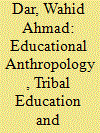

|
|
|
|
|
| Summary/Abstract |
Despite much anthropological research on education in India, the importance of educational anthropology is not properly acknowledged. This article argues for fuller recognition of educational anthropology as a helpful tool to generate well-informed grassroots research throughout India. It connects this argument to concerns that education among tribal and other marginal communities reflects problems over acceptance of diversity. Educational anthropology could help to support sustainable, people-centric educational policies, curriculum construction, and above all better-focused teacher training. Its interventions can provide cohesive glue for nurturing responsible citizenship for all Indians and would facilitate better integration of peripheral tribal communities and other minorities as responsible citizens of a huge nation that claims to be based on respect for composite culture and unity in diversity.
|
|
|
|
|
|
|
|
|
|
|
|
|
|
|
|
| 18 |
ID:
106497
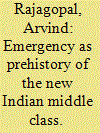

|
|
|
|
|
| Publication |
2011.
|
| Summary/Abstract |
Recent accounts of the National Emergency of 1975-1977 concur that the deviations it represented, while genuine, did not represent any fundamental change on the part of the Indian state, and that the period offers little distinct insight on the post-independence period as a whole. This paper seeks to argue, to the contrary, that the Emergency was a watershed in post-independence history. With its ban on dissent and suspension of constitutional rights, the Emergency sought to suppress all political disturbances to governance. By doing so, it forefronted the problems of postcolonial politics in at least three respects. First, the Emergency demonstrated that coercion was inextricably combined with consent in state-led development. Second, this led to a heavy reliance on practices of communication to redefine coercion and to stage popular consent. Third, in the process, the boundaries of the political were reinforced, emphasizing the friend/enemy difference fundamental to politics. Governance in the aftermath of the Emergency placed an overt reliance on consent over coercion, but in ways that are themselves significant. Categories of culture and community, and related forms of social distinction, gained in importance over earlier developmental distinctions premised on an authoritarian relationship between state and the people. The change meant a shift away from the Nehruvian focus on the economy as the crucial arena of nation-building, involving labour as the key modality of citizenship. Instead, culture and community became the categories that gained political salience in the period of economic liberalization. The mass media were central to this redefinition of the political, multiplying in size and reach, and acquiring market-sensitive forms of address couched in the rhetoric of individual choice. These events, I suggest, are critical to understanding the formation of the new middle class in India, as a category that increasingly defines itself through cultural and consumerist forms of identity, and is less identified with the state.
|
|
|
|
|
|
|
|
|
|
|
|
|
|
|
|
| 19 |
ID:
169047
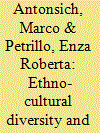

|
|
|
|
|
| Summary/Abstract |
Migration is often said, in the public discourse, to pose a threat to the nation. Yet, Western societies are undergoing an irreversible demographic change spurred in great part by international migration. Thus, the question about how to reconcile nation and diversity remains of crucial importance for many countries. By focusing on the case of Italy, the article attends to this issue, by exploring the response of leftist political parties. We analyse parliamentary debates and laws related to immigration and integration issues (1986–2014), focusing specifically on the Turco-Napolitano Law (1998), possibly the most progressive legislative attempt at incorporating migrants into the Italian nation. Our analysis shows a clear incongruence between the pluralist rhetoric of the political left and its legislative acts on migrants’ national incorporation. This finding is used to reflect on the limits and possibilities of the very idea of inclusive nation in the age of migration.
|
|
|
|
|
|
|
|
|
|
|
|
|
|
|
|
| 20 |
ID:
161051
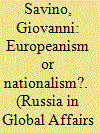

|
|
|
|
|
| Summary/Abstract |
Strange as it may seem, Ukraine could serve as a model for Europe where disintegration sentiments are growing and new approaches are needed to cope with them. But so far Ukraine has been demonstrating the opposite—readiness to repeat the mistakes Europe made before. The article explores the historical roots of reflections on nations and nationalism in the 19th century, with a focus on Giuseppe Mazzini. His view that “the nation is above all” sent an important message to radical movements in Eastern Europe in the early 20th century as a version of integral nationalism preached by Ukrainian thinker Dmitry Dontsov and the Organization of Ukrainian Nationalists. The experience of Soviet korenizatsia (indigenization) in Ukraine and the example of South Tyrolian autonomy in Italy show that the practices of nation-building and federalism produce different and often successful results. However, in the modern European Union faced with such acute conflicts as those in Catalonia and Ukraine these experiences have so far not been used for their resolution.
|
|
|
|
|
|
|
|
|
|
|
|
|
|
|
|
|
|
|
|
|